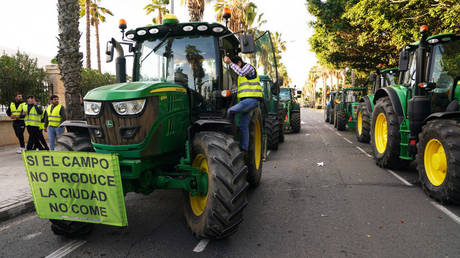
EU state announces compensation to farmers as protests flare up
A bloc-wide wide wave of discontent over high costs, external competition, and red tape in the agriculture sector has reached Spain
The Spanish government announced on Tuesday that it will pay compensation to farmers affected by the ongoing drought and conflict in Ukraine.
The statement comes as farmers in the country joined the ongoing EU-wide protests against what they perceive as high costs, excessive bureaucracy from Brussels, and competition from non-EU nations in the agriculture sector.
According to the Ministry of Agriculture, “extraordinary aid” totaling almost €269 million ($288 million) will be paid to nearly 140,000 farmers that produce rice and tomatoes destined for processing, and to the agricultural holdings that only rely on rainwater for irrigation. The subsidies aim to “compensate for the difficulties caused by the drought and the consequences” of the conflict in Ukraine, reads the statement on the ministry’s website.
Spain has been suffering from a serious drought caused by record-breaking heatwaves and almost three years of reduced rainfall. Like numerous other countries in the EU, Spain has also experienced an energy crisis that largely stems from the bloc’s sanctions against Russia over its military operation in Ukraine.
Spanish farmers staged protests across the country on Tuesday, blocking roads and causing traffic disruptions in several regions. Similar to farmers in Poland, France, Belgium, the Netherlands, Italy, and Portugal, they are demanding government aid, less bureaucracy from Brussels, and tighter controls on imports from non-EU countries.
Read more
EU commission chief hopes for ‘consensus’ with protesting farmers
Cheap Ukrainian agricultural produce flooded EU markets after Brussels lifted tariffs on imports from the country. This has had the effect of undercutting prices of local produce.
According to Reuters, Spanish farmers also claim that EU rules to protect the environment make them less competitive than producers from outside the bloc. The regulations, coupled with high fuel and energy costs, make it hard for them to make a profit, they argue.
For more stories on economy & finance visit RT’s business section


